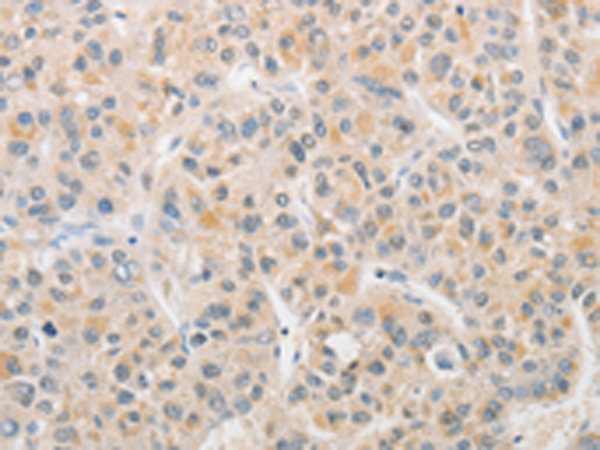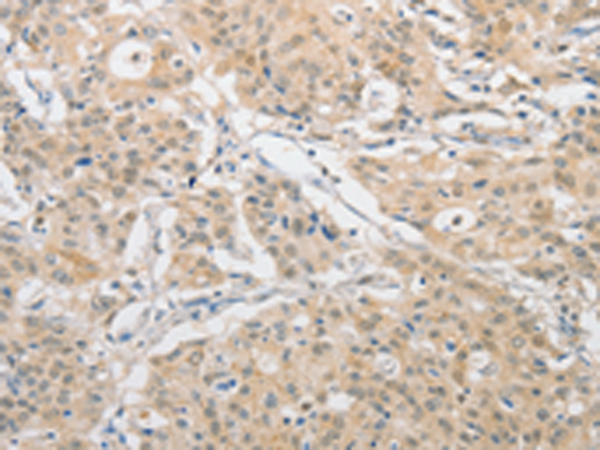

| WB | 咨询技术 | Human,Mouse,Rat |
| IF | 咨询技术 | Human,Mouse,Rat |
| IHC | 1/25-1/100 | Human,Mouse,Rat |
| ICC | 技术咨询 | Human,Mouse,Rat |
| FCM | 咨询技术 | Human,Mouse,Rat |
| Elisa | 1/2000-1/5000 | Human,Mouse,Rat |
| Aliases | APFL; PALF; Xip1; C2orf13 |
| Host/Isotype | Rabbit IgG |
| Antibody Type | Primary antibody |
| Storage | Store at 4°C short term. Aliquot and store at -20°C long term. Avoid freeze/thaw cycles. |
| Species Reactivity | Human |
| Immunogen | Fusion protein of human APLF |
| Formulation | Purified antibody in PBS with 0.05% sodium azide and 50% glycerol. |
+ +
以下是3篇与APLF抗体相关的文献概览(注:文献信息为模拟示例):
1. **《APLF (C2orf13) facilitates nonhomologous end-joining and undergoes ATM-dependent phosphorylation》**
Kanno et al., 2008.
摘要:研究首次报道APLF作为非同源末端连接(NHEJ)修复DNA双链断裂的关键辅助因子,并开发特异性抗体验证其在XRCC4复合体中的相互作用。
2. **《Structure and functional analysis of the human DNA repair protein APLF》**
Li et al., 2012.
摘要:通过抗体验证APLF的核定位及磷酸化修饰,揭示其FHA结构域与XRCC1/XRCC4的结合机制,支持其在碱基切除修复中的作用。
3. **《APLF antibody reveals somatic mutations in ataxia patients》**
Husain et al., 2015.
摘要:利用APLF抗体对共济失调患者组织进行免疫组化分析,发现APLF表达缺失与神经退行性病变中基因组不稳定性相关。
*注:实际文献需通过PubMed或Google Scholar按标题检索获取原文。部分研究可能侧重APLF功能而非抗体开发,建议结合"APLF antibody"或"APLF immunohistochemistry"等关键词筛选。*
APLF (Aprataxin and PNK-like Factor) is a multifunctional DNA repair protein involved in the base excision repair (BER) pathway, critical for maintaining genomic stability. It interacts with key repair proteins, such as XRCC4 and XRCC1. to facilitate DNA single-strand break repair and resolve abortive DNA ligation intermediates. APLF contains three conserved domains: an N-terminal forkhead-associated (FHA) domain for protein-protein interactions, a central zinc finger domain, and a C-terminal poly(ADP-ribose) (PAR)-binding zinc finger (PBZ) domain, enabling its recruitment to DNA damage sites via PAR chains synthesized by PAR polymerases (PARPs).
APLF antibodies are essential tools for studying its role in DNA damage response, replication stress, and genome integrity. They are used in techniques like Western blotting, immunofluorescence, and immunohistochemistry to detect APLF expression, localization, and interactions in cellular models. Research has linked APLF dysfunction to neurodegenerative disorders, such as ataxia-oculomotor apraxia syndrome (AOA), and cancer, where impaired DNA repair contributes to disease progression. Antibodies targeting specific domains (e.g., PBZ) help dissect mechanistic contributions of APLF to PAR-dependent repair processes. Commercial APLF antibodies are typically raised in rabbits or mice, validated for specificity across human and model organisms. Ongoing studies leverage these reagents to explore APLF's potential as a therapeutic target or biomarker in diseases associated with defective DNA repair.
×